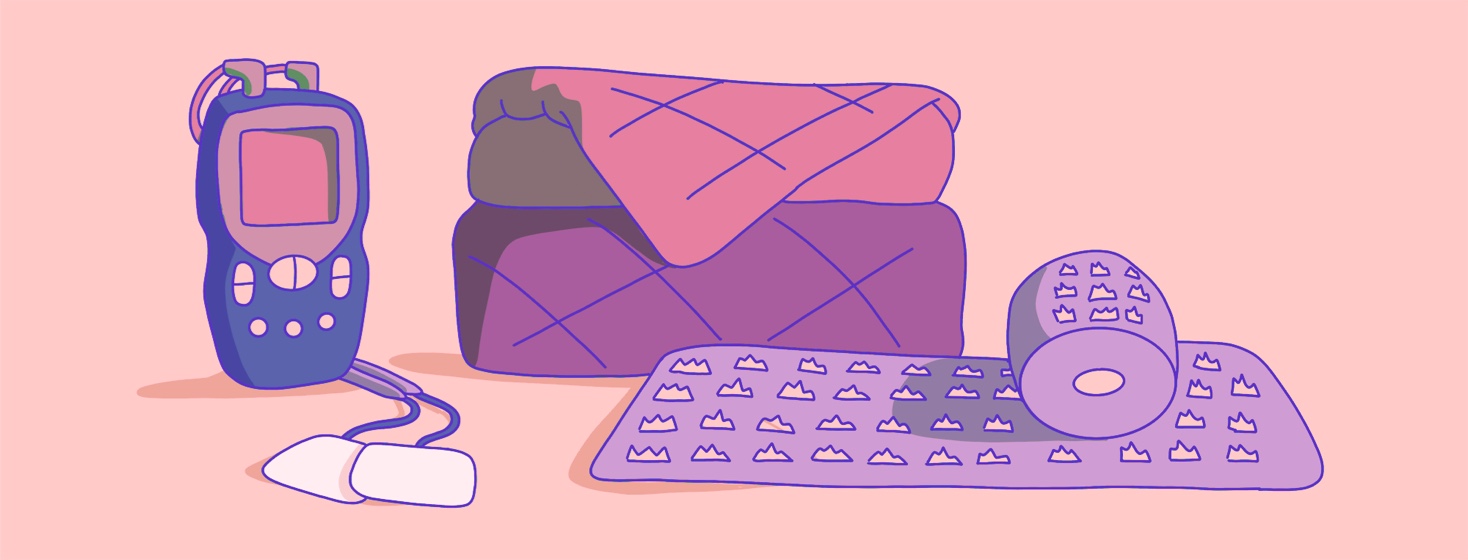Three Weird and Wonderful Gadgets For Pain Relief
Endometriosis is a chronic disease, which means that while some treatments may get rid of some symptoms, the likelihood is that we will be managing this illness long-term. This involves finding things that help ease its more disrupting symptoms, like the sporadic bouts of severe physical pain, and the anxiety and heightened levels of stress that come from living in chronic pain. I am lucky to own three types of gadgets that significantly improve my quality of life.
A weighted blanket
They work in a way that's similar to deep touch pressure therapy (DTP). These blankets are made up of pockets - created in a quilted fashion - that hold tiny weights in each of them. The belief is that pressure on the body will encourage the release of serotonin. This neurotransmitter is linked to a sense of calm and happiness. Research into whether these blankets actually work is scarce.1 But they have been used on children with autism and behavioral issues for a long while.
I suffer from frequent sleep disruptions due to my anxiety and chronic pain. I struggle to get comfortable in bed, and quite often, my lower back and leg pain either wake me up or prevent me from getting a restful night. After being chased around by ads for weighted blankets everywhere, I found one I could afford.
I’ve been using my weighted blanket for more than two weeks now, and since purchasing it, I barely wake up in the middle of the night. I have also been able to relax enough to take some restorative naps in the middle of the day. My endometriosis-related leg pain also seems to benefit from the light pressure and comforting feeling the blanket provides.
Personally, I am in love with my blanket. I don’t know whether it’s agreeing with me because of the colder months that seem to be creeping up. I do wonder whether I will reach for it during the summer since I’m the human equivalent of a furnace.
My trusty TENS unit
A TENS unit delivers transcutaneous electrical nerve stimulation (TENS). It is a battery-operated little device that comes with pads that stick to our skin. It provides small electrical pulses that modify pain signals traveling to our spinal cord and brain. This reduces pain levels and softens any tense muscles. They can also stimulate the production of endorphins.2 Because of this, they can be a very effective pain relief tool when dealing with period pains. They can also ease muscular discomfort, and severe lower back pain, all typical symptoms of an endometriosis flare-up.
A prickly acupressure mat
They are also called needle stimulation pads (NSP). They come with hundreds of prickly plastic bits, that feel a bit like needles when they initially come in contact with skin. As the body relaxes, these small bulges deliver a light form of pressure. These mats are based on Chinese Medicine, and while they work in a similar way to acupuncture, no needles perforate the skin. Manufacturers claim these mats can help with a number of issues including headaches, stress, and insomnia.3
In my experience, my mat has helped ease the pain that originates on the right side of my hip, and my recurrent lower back pain. The mat I own was given to me by my little sister, and it the most random gift I've ever received. Yet it’s one I value enormously.
These gadgets don’t get rid of symptoms completely, nor are they for everyone However, they help me manage pain levels. Psychologically, having something I can reach for to ease any flare-ups, helps me regain a sense of control over this disease.

Join the conversation